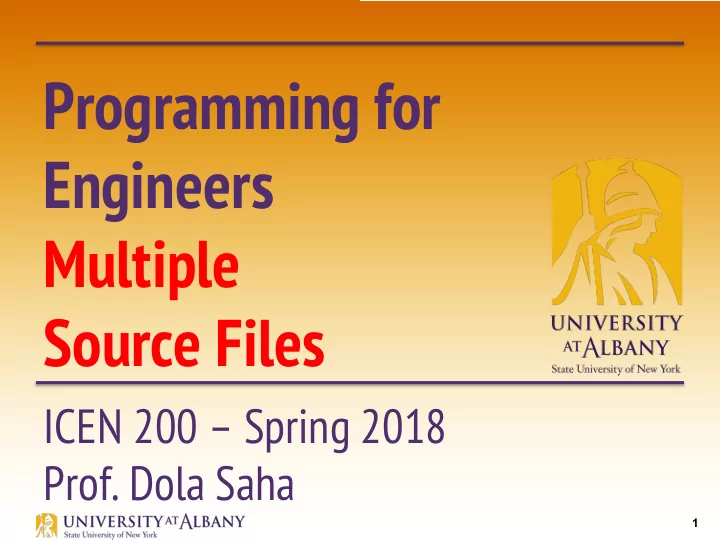

Programming for Engineers Multiple Source Files ICEN 200 – Spring 2018 Prof. Dola Saha 1
C Source Files Ø A C program may be divided among any number of source files. Ø By convention, source files have the extension .c . Ø Each source file contains part of the program, primarily definitions of functions and variables. Ø One source file must contain a function named main , which serves as the starting point for the program. 2
Advantage of Splitting Ø Splitting a program into multiple source files has significant advantages: § Grouping related functions and variables into a single file helps clarify the structure of the program. § Each source file can be compiled separately, which saves time. § Functions are more easily reused in other programs when grouped in separate source files. 3
Header Ø Problems that arise when a program is divided into several source files: § How can a function in one file call a function that’s defined in another file? § How can a function access an external variable in another file? § How can two files share the same macro definition or type definition? Ø The answer lies with the #include directive, which makes it possible to share information among any number of source files . 4
Header Ø The #include directive tells the preprocessor to insert the contents of a specified file. Ø Information to be shared among several source files can be put into such a file. Ø #include can then be used to bring the file’s contents into each of the source files. Ø Files that are included in this fashion are called header files (or sometimes include files ). Ø By convention, header files have the extension .h . 5
MACRO Ø Most large programs contain macro definitions and type definitions that need to be shared by several source files. Ø These definitions should go into header files. 6
Example MACRO Ø Suppose that a program uses macros named BOOL , TRUE , and FALSE . Ø Their definitions can be put in a header file with a name like boolean.h : #define BOOL int #define TRUE 1 #define FALSE 0 Ø Any source file that requires these macros will simply contain the line #include "boolean.h" 7
Example Sharing MACRO Ø A program in which two files include boolean.h : 8
MACRO Sharing – Why? Ø Advantages of putting definitions of macros and types in header files: § Saves time. We don’t have to copy the definitions into the source files where they’re needed. § Makes the program easier to modify. Changing the definition of a macro or type requires editing a single header file. § Avoids inconsistencies caused by source files containing different definitions of the same macro or type. 9
Sharing Function Prototype Ø Suppose that a source file contains a call of a function f that’s defined in another file, foo.c . Ø Calling f without declaring it first is risky. § The compiler assumes that f ’s return type is int . § It also assumes that the number of parameters matches the number of arguments in the call of f . Ø So, we put f ’s prototype in a header file ( foo.h ), then include the header file in all the places where f is called. Ø We’ll also need to include foo.h in foo.c , enabling the compiler to check that f ’s prototype in foo.h matches its definition in foo.c . 10
Sharing Variable Ø To share a variable among files, we put its definition in one source file, then keyword extern is used to declare a variable without defining it. Ø For example, § int i; // in file1.c § extern int i; // in file2.c Ø extern informs the compiler that i is defined elsewhere in the program, so there’s no need to allocate space for it. 11
Compiling Multiple Source Files hello.h helloFn.c helloExample.c $gcc helloExample.c helloFn.c -o hello $./hello Hello ICEN 200! $ 12
Recommend
More recommend